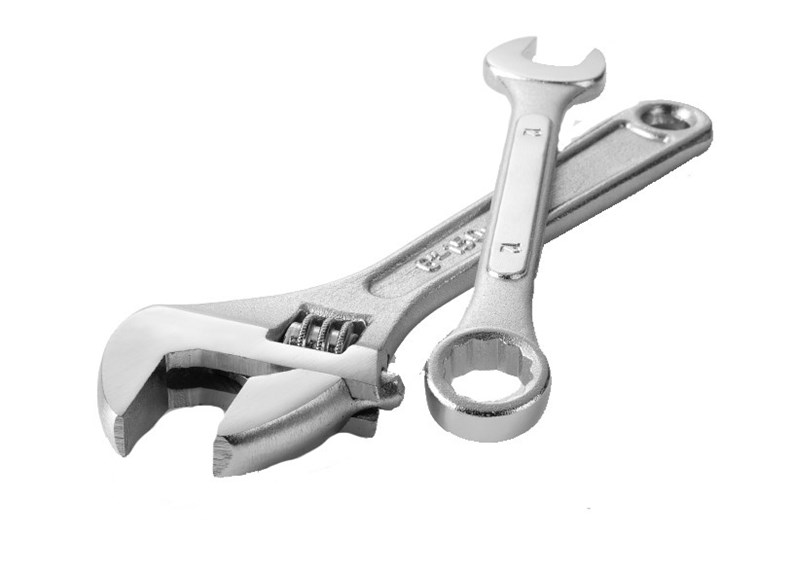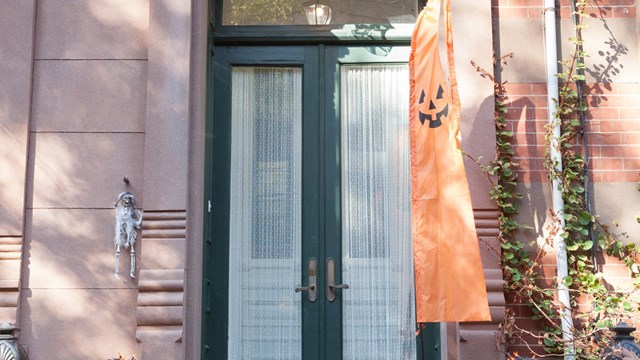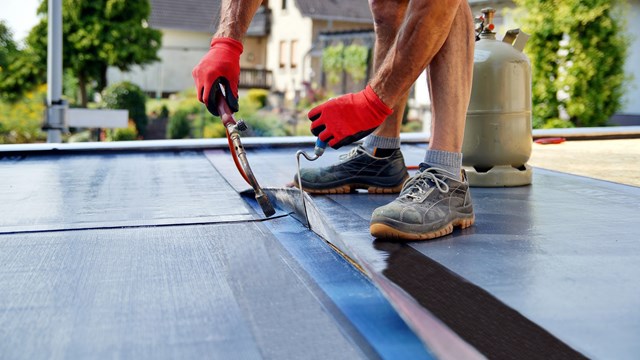For any residential development, dirt, extreme weather conditions, and everyday wear-and-tear can play havoc with even the most durable building materials, such as stone or steel. Those same elements take an even greater toll on painted or vinyl-sided surfaces, making good maintenance on these materials as important as it is for your community association's roof, landscaping, pool area, or asphalt.
Painted items can include anything from the clubhouse doors and windows to the wooden deck or the wrought-iron fence around your pool area.
Spring Painting, Spring Cleaning
An effective maintenance program should examine what items need a touch of paint now and then and when the building's siding needs a thorough cleaning. Periodic inspections, timely and proper surface preparation and repair, and quality paint applied at recommended intervals by a knowledgeable professional are also a good idea.
Time, along with weather and exposure to the elements, takes its toll on an association's buildings, clubhouses, fencing and other common areas, tarnishing glossy finishes and causing colors to fade. That means a refurbishment of the paint job, though for many boards the right time to call in a painting contractor might vary. According to Olin Johnson, owner of the North Shore County franchise of Certapro Painters, a power washing and painting service in Plainsborough, "The exterior of a building should be done every five to seven years. I would suggest five, but most people tend to wait longer."
Amedeo Bove, owner of Interstate Power Washing in Warren, New Jersey, adds that although buildings should be repainted every five years, the timeframe for decks and fences is around two years. "Most of the time you're not painting a deck or a fence—more often, you're staining them," Bove says. "If you have an especially harsh winter, it could give you a shorter timeframe, because there might have been a lot of snow on the decks for a long period of time, which can cause damage that needs more immediate attention."
Exterior refurbishment doesn't end with just the paint job, however. Vinyl siding must also be kept clean and polished, preferably biannually, says Johnson. "The frequency," he continues, "depends on whether the building is near a road and exposed to dirt and grit, of if it's near trees and exposed to mildew." And buildings in more urban areas especially face exposure to chemical fumes, road debris and pollution.
According to John Glynn, managing member of Garden State Commercial Services LLC, a commercial contractor in Bayonne, when it comes to power washing a building's exterior, "A standard power wash could be done on an annual basis, but a deep cleaning with chemicals doesn't need to be done for seven to 10 years. Some buildings are right by highways and get dirty faster than others. You make a visual inspection as to how the building looks physically. When you're cleaning a building you're using a lot of water, so you don't want to do that more than you have to."
Move Over, Mr. Clean
Although different methods and products designed for exterior cleaning abound, Johnson says power washing is by far the most popular. Usually the process involves some kind of cleaning agent sprayed on with the washing fluid. Bleach has traditionally been an industry favorite as a base for cleaning fluids, but today environmental concerns and the lifespan of more delicate surfaces has led to several advances and alternatives. Johnson says Benjamin Moore has some new agents that are less harsh and just as effective. "Most cleaning agents today don't contain bleach," he says. "For example, there's a new product available now called Jomax, which is more gentle, though it does contain some bleach."
According to Bove, "Although a hot-water power washing in conjunction with the appropriate cleaner works best on cleaning vinyl siding or any other kind," bleach is still a component of the detergent used. "Nothing kills mildew like bleach," he explains. "As long as you use it appropriately it's fine, and it's recommended by the siding manufacturers most of the time."
The type of chemical compound used for the job "is a function of the amount of dirt and how aged the problem is," Glynn says. "If dirt has been on there a long time, it usually requires a chemical to get it off, which is usually some type of acid, or a pre-blended chemical purchased from one of several chemical companies." He says cleaners are available for limestone, brick, and just about every type of surface, and come in variable strengths depending on the amount of grime and soil on the surface to be cleaned.
Glynn says all products used by reputable cleaning companies are EPA approved—otherwise, they can't get through the screening process. "For example," he says, "we use Sure Klean products because they're very mild, and they have cleaning products for every type of surface. A lot of the products have a mild acid in them [to help dissolve dirt]."
Technology also makes painter and power washers' jobs much easier. "Nowadays instead of using ladders a company will use a man lift," Bove says. "It's safer and quicker and allows you access to higher parts of the building." The man lift, he says, makes the work more efficient—but that's not the only thing that makes their job easier.
Bove says a good company will have a system that allows them to fill their water source from a fire hydrant. That way, he explains, they don't have to disturb or use unit owners' water. "We also have five-hundred gallon water tanks that are mounted on trailer machines. The machine is self-contained and doesn't need to be hooked up to any water source."
Bove says building tenants often don't want power washers using their water, though when using a fire hydrant one must obtain a permit from the water company and then pay for the water used. Sometimes, he continues, a power washer will run garden hoses from the hydrant to a portable machine. "That's usually not really a good idea because it causes a trip hazard if people are walking around and hoses are all over the place," he says. "Having the water tank and being able to go where you need to go with it is a benefit."
Cleanliness Does Not Equal Costliness
The cost of cleanliness varies according to the surface or the area to be painted or cleaned. For instance, Johnson says the standard rate for an exterior cleaning job on an average two-story house is $350.
When it comes to power cleaning a co-op or condo development, Bove says the price runs to about $100 a unit for an exterior siding job. He says a deck or a fence usually run about $1.50 to $2 per square foot. The cost per unit for a paint job ranges from $300 to $400 a unit.
Height and location also play an important factor when determining price- per-square-foot for a cleaning. Tall buildings in urban areas, for instance, can expect to spend more than a building in a less populated area. Glynn describes pricing as a case-by-case basis that goes from as little as 90 cents to $2.50 per square foot. The type of cleaning—water or chemical—also influences the price-per-square-foot. "The water cleaning wouldn't be more than ninety cents to one dollar," Glynn says. "Height comes into effect as well, because scaffolding costs go up the higher the building, and in order to do a multi-story cleaning you have to put up a rig."
Knock on Wood
Wood presents several new challenges when it comes to cleaning or repainting. "If the wood is rotten, it doesn't matter how often you clean it," Johnson says. "If you use harsh cleaners like bleach you can damage the wood. A house that's not sealed properly runs the risk of water getting inside, so you want to make sure all the windows are sealed."
Bove says that in addition to rot and decay, splintering is another issue that makes repainting more difficult. "Both the wood itself and any pre-existing peeling paint need to be sanded prior to a new coating being applied," he says. "Most guys would recommend replacing rotten wood as long as the damage isn't very extensive. The building will probably get a better price [on those minor repairs] because the contractor is already on the job."
The Insurance Issue
Although insurance isn't technically required of a painter or power washer, Johnson wouldn't recommend hiring anyone with less than a million-dollar policy, which, he says, is the industry standard.
"Most complexes want a $1 million liability policy and umbrella," Bove adds. "I think they're better off hiring a professional. Unless it's a really small complex, I don't think most staffs are equipped with the manpower or equipment to do something like that."
Glynn says each contractor has to have a full insurance package—including liability and workers compensation—and it has to be for the specific work that they're doing. "Unfortunately, the rates vary for different types of construction," Glynn says. "Sometimes some contractors get insured to do the least expensive work, and then they go and do everything. Insurance is very important."
From Lifespan to Approval
Most paints have an average lifespan of about five years. Benjamin Moore manufactures several lines of exterior house paint, including both oil-based and latex preparations, though Johnson says if you're repainting siding, it's best to use latex paint.
"Nowadays the latex paints use an oil- or latex-based primer," Bove explains. "That's what most people are using, and they hold up well. Most people are not using oil-based paints anymore because latex paints have come such a long way." Latex paint, he says, is easier to use and lasts just as long if not longer than its oil-based predecessor, but is less messy, dries much faster, and cleans up much more easily.
Although the choice of paint might be optional, the ability to use it is not. Bove says the decision to repaint a unit or any part of the building itself "is more of a board decision. Owners and tenants can't do anything unless they okay it with the board."
Keeping your association community looking its best involves much more than just some paintbrushes and elbow grease, but with a proper maintenance schedule and the right kind of cleaning regimen, your association's exteriors will be looking like new for years to come.
Michael McDonough is a freelance writer living on Long Island.







Comments
Leave a Comment